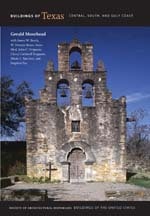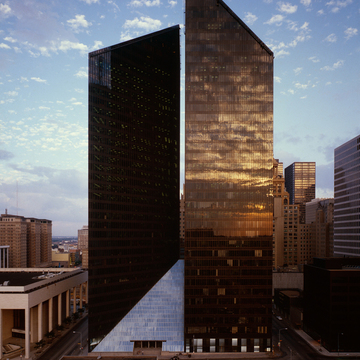Philip Johnson and John Burgee's pair of thirty-six-story towers, containing 1.8 million square feet of space, with their diagonal geometry, reflective symmetry, and dark glass and aluminum curtain walls, “broke out of the box” (as Johnson phrased it, borrowing a line from Frank Lloyd Wright) of engineering efficiency represented by One Shell Plaza ( HN7). Gerald D. Hines Interests built Pennzoil Place as headquarters for two oil companies, Pennzoil and its onetime affiliate the Zapata Corporation. Johnson and Burgee applied the formal explorations of such American minimalist sculptors as Robert Morris to high-rise architecture. Hines discovered that Pennzoil's formal singularity was more profitable than the monumental efficiencies of One Shell Plaza. In Pennzoil's wake Hines and other Houston developers pressed their architects to design formally extroverted tall buildings. The architectural consequences of Pennzoil's evolutionary breakthrough are visible across the street at 700 Louisiana in the Postmodern fifty-six-story, 1.52-million-square-foot Bank of America Center (RepublicBank Center) of 1983 by Johnson/Burgee Architects and Kendall/Heaton Associates. Pennzoil represents what was most promising about an epoch in Houston's commercial history when energy encompassed not only oil and gas but civic imagination as well.
You are here
Pennzoil Place
If SAH Archipedia has been useful to you, please consider supporting it.
SAH Archipedia tells the story of the United States through its buildings, landscapes, and cities. This freely available resource empowers the public with authoritative knowledge that deepens their understanding and appreciation of the built environment. But the Society of Architectural Historians, which created SAH Archipedia with University of Virginia Press, needs your support to maintain the high-caliber research, writing, photography, cartography, editing, design, and programming that make SAH Archipedia a trusted online resource available to all who value the history of place, heritage tourism, and learning.




















